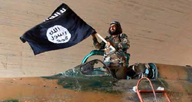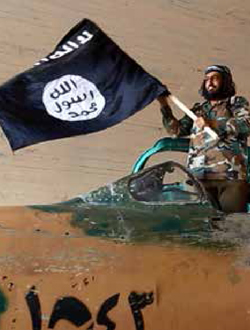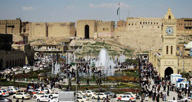“The Islamic State of Iraq and Syria (ISIS) is…

Kamran Bokhari
… the first transnational jihadist organization to seize control of territory that transcends national borders. Its success is due to its ability to exploit the conflicts between the Sunnis and Shia in Iraq and Syria. As such, countering the group requires an accommodation between two rival powers: Iran, which leads the Shia, and Saudi Arabia, which leads the Sunnis.
ISIS is in many ways the byproduct of the Sunni-Shia struggle, which erupted with the US invasion of Iraq in 2003. The group’s founder, Abu Musab Al-Zarqawi, took advantage of Sunni disenfranchisement and founded a group called Jamaat Tawheed wal-Jihad, which quickly emerged as a key player in the Sunni insurgency.
A year later, this new jihadist group allied with Al Qaeda, referring to itself as Tandheem Al Qaeda fi Bilad al-Rafidain. When Al-Zarqawi was killed in June 2006, the group had already begun to ignore orders from senior Al Qaeda leaders. It formed close partnerships with local Iraqi tribes, eventually forming an alliance, known as the Mujahideen Shura Council, consisting of various Sunni insurgent groups. It later donned a new moniker: the Islamic State of Iraq.
In 2007, the US reached an agreement with Iraq’s Sunni tribes, effectively ending the insurgency. For the next few years, the Islamic State of Iraq tried to continue conducting its suicide bombing campaign, but saw its real opportunity for revival in the Syrian civil war in 2011. There the one-time terrorist cell became a powerful militia, which funded itself in no small part by the oil fields now under its control. After consolidating itself in Syria, the group changed its name to the Islamic State of Iraq and Syria and formally broke from Al Qaeda. Though it fought in Syria, it never lost sight of its home in Iraq, where the withdrawal of the US gave it ample space to reclaim lost ground. By exploiting the security vacuum and the alienation of Sunnis – a result of the Shiite policies in Baghdad – the group indeed reclaimed space from which it was once expelled.
After expelling the Iraqi military from Sunni territory, the group ‘re-established’ the caliphate and changed its name to the Islamic State. The Islamic State’s takeover of Mosul, Iraq’s third largest city, and its subsequent advances stem from its cooperation with Sunni communities – especially former Baathist military officers and commanders, on both sides of the border – an essential part of its operations, considering that it is not a particularly large group.
This relationship is the source of the Islamic State’s strength and, at the same time, its vulnerability. Many Sunnis are using the Islamic State as leverage for greater political power. Likewise, the Islamic State is using the Sunnis to enhance its transnational ambitions. Therefore, the various international actors that have a stake in Iraq – the US, Iran, Saudi Arabia and, among others, Turkey – are working with various domestic Iraqi actors to drive a wedge between the Islamic State and its Sunni partners.”
» Kamran Bokhari is the Vice-President of Middle Eastern and South Asian Affairs at Stratfor.
Myriam Benraad
… originellement apparu en Irak en octobre 2006, émanation de la mouvance locale d’Al-Qaïda. Sur fond de marginalisation politique structurelle des sunnites après le renversement de Saddam Hussein, l’organisation salafiste-jihadiste s’est employée à restaurer le califat musulman par tous les moyens, y compris par l’usage d’une terreur et d’une barbarie les plus extrêmes. Ce mode de gouvernement historique est, en effet, considéré par les combattants comme un véritable âge d’or, dont l’État islamique ne serait au fond que le prélude. Depuis, c’est une triple conquête militaire, territoriale et politique qui est à l’œuvre et a bénéficié du contexte de guerre civile dans la Syrie voisine et de la déstabilisation plus large du Moyen-Orient. À force de violents combats et de coups d’éclat, l’EI est parvenu à s’arroger le contrôle de provinces entières dans ces deux pays, tenant à la fois tête aux régimes en place et aux autres factions de l’opposition. L’assaut fulgurant lancé le 10 juin dernier à Mossoul, puis la restauration unilatérale du califat annoncée par l’émir en chef du groupe, Abou Bakr al-Baghdadi, sanctionnent la détermination qui est celle des jihadistes à s’emparer du monde arabe et musulman dans son ensemble, même au prix d’un bain de sang et de l’élimination pure et simple de tous ceux (chiites, chrétiens, Yézidis, Chabaks, sunnites modérés) perçus comme faisant obstacle à leur projet. Leur ambition meurtrière est d’ailleurs loin de se limiter à l’Irak et à la Syrie, comme en témoigne l’appellation plus récente de l’État islamique: les jihadistes entendent bel et bien placer sous leur coupe la région, du Machrek au Maghreb, en passant par l’Afghanistan, le golfe Persique et le Sahel plus à l’Ouest.
Au-delà, ce sont l’Occident et le monde entier qui sont directement visés par cet effroyable irrédentisme. La réponse ne pouvait être que militaire dans un premier temps. De ce point de vue, le sursaut occidental, américain comme européen, et l’appui armé accordé aux forces luttant contre les jihadistes, les peshmergas kurdes et l’armée irakienne en particulier, sont évidemment les bienvenus. Mais ils sont tardifs et insuffisants. Seule une plus ample mobilisation citoyenne, en Irak comme en Syrie, pourra véritablement venir à bout de l’EI et de son dessein. Pour cela, une plus grande assistance humanitaire et des armes seront nécessaires. Les puissances régionales, au premier rang desquelles les régimes sunnites (Arabie saoudite, Turquie, Qatar) et l’Iran chiite, qui se sont livrées des guerres par procuration sur ces deux théâtres de conflit, doivent également trouver un terrain de dialogue diplomatique en vue de limiter les dommages collatéraux de ces crises délétères. Les processus de transition amorcés en Irak en 2003, et en Syrie depuis 2011 doivent enfin retrouver leur sens par un soutien clair et assumé de la communauté internationale aux derniers démocrates qui, dans ces pays, sont les seuls susceptibles d’assurer un avenir à des populations civiles pour l’heure prisonnières d’un double étau de la tyrannie: la dictature et le chaos».
» Myriam Benraad est une analyste politique et ancienne chercheuse de la région Moyen-Orient et Afrique du Nord au Conseil européen des relations étrangères.
Dan Stigall
… a non-state armed group that, by exploiting ungoverned spaces and state fragility in the Middle East, has asserted a degree of control over a large swath of territory that transcends the borders of Iraq and Syria. In so doing, ISIS has become a stark reminder of the dangers posed by ungoverned spaces – lawless expanses of the globe left effectively unregulated by sovereign authority, where terrorist organizations and other transnational criminal groups are permitted to thrive.
ISIS has proclaimed a caliphate (or an Islamic state) in the area that it currently controls. It is important to recognize, however, that ISIS is not a wholly unique phenomenon. On the contrary, it is one of a plurality of non-state armed groups willing to use popular disaffection, existing identity cleavages, and appalling levels of brutality to gain control over territory where legitimate government presence is weak or wanting.
Recent events in Mali, in this respect, provide an interesting parallel. There the exodus of armed Tuaregs from Libya after Gaddafi’s ouster served to vitalize other non-state armed groups in northern Mali. Most notably, in 2012, the National Movement for the Liberation of Azawad (MNLA) – a Tuareg rebel group that was formed for the purpose of creating an independent state in northern Mali – launched a rebellion with assistance from various terrorist organizations operating in the region, namely Al Qaeda in the Islamic Maghreb (AQIM), Ansar Dine, and the Movement for Oneness and Jihad in West Africa (MUJWA).
As with ISIS in Iraq, this syndicate of non-state armed groups in Mali succeeded in overwhelming Malian government forces. Similar to what ISIS has thus far achieved in Iraq, MNLA and Ansar Dine seized major cities in northern Mali, including Gao, Kidal and Timbuktu. In response, the UN Security Council passed a number of resolutions that provided international legal authority for an armed intervention. This led, ultimately, to Operation Serval – a French-led multinational engagement in Mali that included regional components and has been largely viewed as successful. This multinational effort was coupled with capacity-building efforts by numerous international partners.
While there are certainly differences between Iraq and Mali, there is reason to believe that a similar multinational effort in Iraq will yield similar results. Already, with US support, Iraqi forces have prevailed in battlefield engagements against ISIS and have retaken critical terrain – witness the combined Iraqi-American effort that resulted in renewed control of the Mosul dam, a strategically important piece of infrastructure. This indicates that, while ISIS may thrive in the vacuum of ungoverned spaces, it will wilt and recoil in the face of significant and sophisticated opposition.
ISIS is significant but not unique – and there are recent examples of how the international community may successfully counter such threats. An international effort targeting ISIS – in partnership with a reconstituted Iraqi army, Iraq’s allies, and regional partners in the Middle East – can serve to effectively counter this terrorist organization, prevent further instability, and halt the ongoing atrocities that have been the hallmark of ISIS.”
» Dan Stigall is an attorney with the US Department of Justice, Office of International Affairs. He previously served in Iraq with the US Army JAG Corps. He is the author of Counterterrorism and the Comparative Law of Investigative Detention.
Ali Mamouri
… bursting onto the world stage by being the most successful jihadist extremist group energized by a global agenda that threatens not just the region, but the world. The group combines disillusioned Al Qaeda elements, dismissed Baath military officers, fundamentalists activated by the Arab Spring, and Salafi Muslims from the West. However, the origins of ISIS predate the 2003 US invasion of Iraq and can be traced to earlier Salafi groups: Abu Musab Al-Zarqawi’s Al-Tawhid wal-Jihad formed in the 1990s, which evolved into Al Qaeda in Iraq. After Zarqawi was killed in June 2006, his successor Abu Omar Al-Baghdadi merged with another extremist group, the Mujahideen Shura Council, and adopted the name Islamic State of Iraq. When he was killed in 2010, he was replaced by Abu Bakr Al-Baghdadi. The Arab Spring uprisings in Syria opened the door for ISIS in that theatre, and new opportunities presented themselves in 2012 in Iraq as Sunni provinces rebelled against Shia administration.
The ideology of ISIS is shared by other Salafi organizations that strive through jihad to reverse history and restore what they regard as the pure Islam practiced at the dawn of the Islamic era. This philosophy has been gradually developing on the strength of grassroots supporters in Saudi Arabia, the Indian subcontinent and Egypt. Although Salafism developed differently in each theatre, Al Qaeda and its successor ISIS adopted a combination of all of them: Wahhabism from Saudi Arabia, the Caliphate movement from India, and political Islam as followed by the Muslim Brotherhood in Egypt. Salafi strategy was laid out decades ago by the Pakistani scholar Abul Ala Maududi and the Egyptian Sayyid Qutb in three broad phases: Iman (faith in pure Islam), Hijra (migration to an Islamic society) and Jihad (fight to establish a religious state). Consequently, fundamentalists are moving to Syria and Iraq because they see this as an opportunity to create a historic Islamic utopia.
Regional and international powers initially viewed ISIS as a tool to promote their own agendas in Syria and Iraq, and offered the group broad aid either directly or indirectly. This was in addition to other sources of income, including vast sums stolen from Iraq’s central bank, weapons and equipment captured from fleeing Iraqi forces, military assistance extended by Western countries to secular proxies opposing the Syrian regime falling into the hands of ISIS, oil revenues from wells under ISIS control, and also taxes on people under ISIS administration.
ISIS aims to extend its territory to the entire Muslim world, and to attack non-Muslim areas in accordance with its belief in jihad. The group has developed into a professional irregular army of up to 30,000 soldiers motivated by a strong ideology, with operations from Iraq to Lebanon, and many sleeper cells worldwide. In the face of international indecision in respect of how to deal with ISIS, the likelihood of the group menacing the region for the foreseeable future is high. At the same time, due to the group’s continued utility to specific regional powers in destabilizing Syria and Iraq, it may be that no one wants to entirely annihilate ISIS, but rather merely to contain it.”
» Ali Mamouri, a columnist for Al-Monitor’s Iraq Pulse, is a researcher and writer who specializes in Salafism, Islamic fundamentalism and political Islam.












